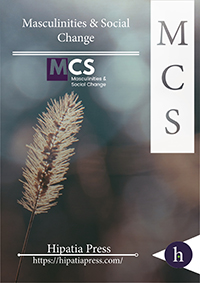Official Discourse on Family and Fatherhood in Post-1949 China
Keywords:
Downloads
Abstract
This paper aims to investigate three main research questions regarding the history of family and fatherhood in China since 1949: a) What 'ideal father' has the party-state sought to promote at different times? b) How consistent have official messages been? What have been the key shifts in official discourse on family and fatherhood since the Mao era? c) Why have these shifts occurred? Analysis of selected policy statements and print media reveal four main phases, with distinct findings in each. During the period of collectivization (1950s to 70s), the Communist Party of China (CPC) adopted the nationalist model of parenting. Fathers were explicitly suggested to devote themselves to economic development. During the period of de-collectivization (late 1970s to mid-1990s), CPC adopted an individualist model of parenting. There was increasing encouragement for father's participant in child education. During the period of marketization (mid 1990s to 2011), CPC promoted a state-supported model of parenting. Father's active participation in household duties was more expected. During the period of individualization (2012 to the present), China set up community model of parenting. Father's dual role of nurturer and provider is more emphasized.
Downloads
References
Abbott, D. A., Ming, Z. F. & Meredith, W. H. (1992). An evolving redefinition of the fatherhood role in the People's Republic of China. International Journal of Sociology of the family, 45-54.
Google Scholar CrossrefAnderson, E. (2009). Inclusive masculinity: The changing nature of masculinities. London: Routledge.
Google Scholar CrossrefCao, S. & Lin, X. (2019). Masculinizing fatherhood: Negotiation of Yang and Jiao among young fathers in China. Journal of Gender Studies, 1-11.
Google Scholar CrossrefChong, G. P. L. (2013). Chinese bodies that matter: The search for masculinity and femininity. The International Journal of the History of Sport, 30(3), 242-266.
Google Scholar CrossrefConnell, R. (2012). Masculinity and Social Change. Hipatia Press.
Google Scholar CrossrefDavis, D. S., & Harrell, S. (Eds.). (1993). Chinese families in the post-Mao era (Vol. 17). University of California Press.
Google Scholar CrossrefFeng X.T. (1996). The changing image of female-an analysis of ‘Women of China’. Nanjing Social Journal, pp.13-18.
Google Scholar CrossrefFincher, L. H. (2016). Leftover women: The resurgence of gender inequality in China. Zed Books Ltd..
Google Scholar CrossrefFong, M. (2017). One child:life, love and parenthood in modern China. One world Publications.
Google Scholar CrossrefHeng, G., & D. Janadas. (1995). ‘State Fatherhood: The Politics of Nationalism, Sexuality, and Race in Singapore.’ In Bewitching Women, Pious Men: Gender and Body Politics in Southeast Asia, edited by A. Ong and Michael G. Peletz, 145–159. Berkeley and Los Angeles, CA:University of California Press.
Google Scholar CrossrefHo, D. Y. F. (1987). Fatherhood in Chinese culture. In M. E. Lamb (Ed.), The father's role: Cross-cultural perspectives (pp. 227-245). Hillsdale, NJ: Erlbaum.
Google Scholar CrossrefHong, X. (2013). Social stratification and childrearing values in contemporary China. In International handbook of Chinese families (pp. 277-287). Springer New York.
Google Scholar CrossrefHu, L. (2018). Is masculinity ‘deteriorating’ in China? Changes of masculinity representation in Chinese film posters from 1951 to 2016. Journal of Gender Studies, 27(3), 335-346.
Google Scholar CrossrefHulei, E., Zevenbergen, A. A., & Jacobs, S. C. (2006). Discipline behaviors of Chinese American and European American mothers. Journal of Psychology, 140, 459-475.
Google Scholar CrossrefIshii-Kuntz, M. (2015). Fatherhood in Asian contexts. Routledge handbook of families in Asia, 161-174.
Google Scholar CrossrefJiang Z.L. (1994). After my son has grown up. Women of China News.pp.33-34
Google Scholar CrossrefKang K.Q. (1982). Marriage and Family Work with Children. ACWF press.
Google Scholar CrossrefLi, X. (2018). Chinese fathers in the 20th century: Changing roles as parents and as men. Nordic Journal of Feminist and Gender Research, 26(4), 1-18.
Google Scholar CrossrefLiong, M. (2017). Chinese fatherhood, gender and family: Father mission. Springer.
Google Scholar CrossrefLouie, K. (2014). Chinese masculinity studies in the twenty-first century: Westernizing, Easternizing and globalizing wen and wu. NORMA: International Journal for Masculinity Studies, 9(1), 18-29.
Google Scholar CrossrefMolenda-Kostanski, Z. (2016). Asian American Men and Fatherhood: Relationship between Acculturation, Gender-Role Conflict, Parenting Self-Efficacy, and Father Involvement. Seton Hall University Dissertations and Theses.
Google Scholar CrossrefO'Brien, M. (2009). Fathers, parental leave policies, and infant quality of life: International perspectives and policy impact. The Annals of the American Academy of Political and Social Science, 624(1), 190-213.
Google Scholar CrossrefSeward, R. R., & Stanley-Stevens, L. (2014). Fathers, fathering, and fatherhood across cultures. In Parenting across Cultures (pp. 459-474). Springer, Dordrecht.
Google Scholar CrossrefShek, D. T. (1998). Adolescents' perceptions of paternal and maternal parenting styles in a Chinese context. The Journal of Psychology, 132(5), 527-537.
Google Scholar CrossrefSilverstein, L. B. (1996). Fathering is a feminist issue. Psychology of Women Quarterly, 20(1), 3-37.
Google Scholar CrossrefWalby, S. (1990). Theorizing Patriarchy. Oxford: Blackwell Publishers.
Google Scholar CrossrefWang L. (1989). The criteria of fathering. Parenting Science. p.17
Google Scholar CrossrefWang X. (2017). Father needs to hold up half of the sky in the family. The Family of China. pp. 10-12
Google Scholar CrossrefWang Z. (2010). Creating the socialist feminism-an analysis of ‘Women of China’ (1949-1966). Nanjing University Journal.pp.58-75.
Google Scholar CrossrefXie, Y. (2013). Gender and family in contemporary China. University of Michigan, Institute for Social Research, 1-10.
Google Scholar CrossrefXu, Q. (2017). Fatherhood, Adolescence and Gender in Chinese Families. Springer.
Google Scholar CrossrefYan, Y. (2003). Private life under socialism: Love, intimacy, and family change in a Chinese village, 1949-1999. Stanford University Press.
Google Scholar CrossrefYang, J. (2010). The crisis of masculinity: Class, gender, and kindly power in postâ€Mao China. American Ethnologist, 37(3), 550-562.
Google Scholar CrossrefYuan L.L. (1997). Dialogues in a family. Women of China.pp.18-19.
Google Scholar CrossrefDownloads
Published
Almetric
Dimensions
How to Cite
Issue
Section
License
All articles are published under Creative Commons copyright (CC BY). Authors hold the copyright and retain publishing rights without restrictions, but authors allow anyone to download, reuse, reprint, modify, distribute, and/or copy articles as the original source is cited.















